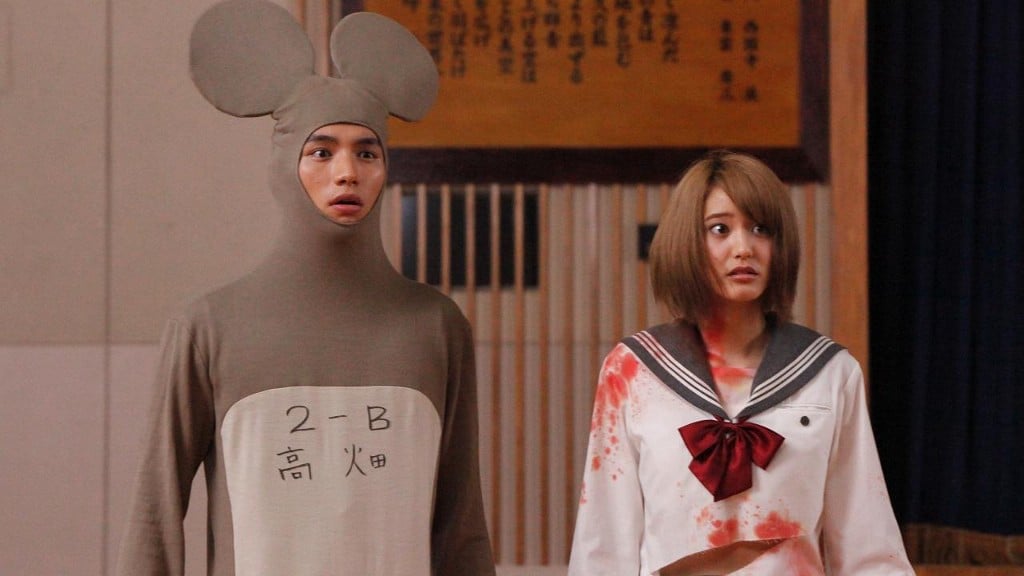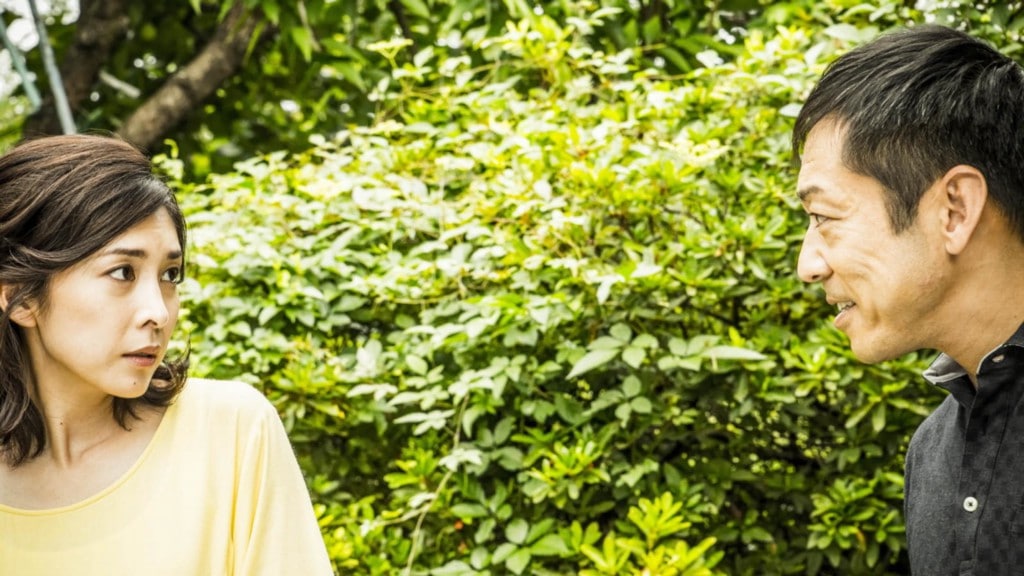We take a look at As the Gods Will and Creepy.

Genre film festivals are often among my favorites because they focus on the kind of movies typically absent from theaters ‐ the odd, the disturbing, the foreign. Film lovers in Toronto know what I’m talking about as they’re now on day six of the 11th Annual Toronto After Dark Film Festival.
Nine nights of features and shorts celebrating the dark and the weird, and while I’m not there physically I’m there in spirit. The two films playing today are As the Gods Will and Creepy, and my reviews are below.
Toronto After Dark Film Festival 2016 runs October 13–21, follow our coverage here.
As the Gods Will
There’s an old saying that goes “If you don’t like the weather, wait five minutes and Miike Takashi will make another movie.” I may not have that exactly right, but it’s accurate for the prolific Japanese director who fifty-plus movies into his twenty-five year filmmaking career shows no sign of slowing down. Sure, the quality of much of his output suggests he might benefit from a more relaxed pace, but when he’s on he’s capable of delivering some incredible, cross-genre cinema with the likes of Happiness of the Katakuris, Visitor Q, Fudoh: The Next Generation, and others among them.
He’s not quite on with As the Gods Will.
“God, my life is very boring,” says high school student Shun (Fukushi Sota) to no one in particular, but he no quicker asks for relief then his life is turned upside down with the arrival of an angry head named Daruma (for the doll style). The being blows up their teacher’s head and forces the class into a deadly game of Red Light Green Light that leaves the walls and floors painted red. Shun survives the game but moves on to second round involving other students and a giant Maneki-neko cat. The games continue, and as the survivors dwindle the answers increase revealing that the same thing is happening all around the world.
News broadcasts see global panic spreading as millions of teenagers have their heads exploded by game-masters in giant, floating cubes hovering over the Earth’s cities. Can anything be done to stop it? Probably not, but for Japan at least this scenario carries an air of the familiar.
Kinji Fukasaku’s Battle Royale started the cinematic trend in 2000 of high-school students finding themselves in bloody life and death scenarios, and it remains the best of the bunch. Similar films ‐ teenage carnage married to themes of Japan’s casually violent youth ‐ followed, but only Sion Sono’s recent Tag managed to balance gory fun with real dramatic weight.
Based on a popular manga, as is apparently required by law for filmmakers in Japan, Miike’s As the Gods Will sets up an intriguing premise but fails to nail tone, purpose, or anything resembling an emotional connection with the characters.
Things grow increasingly goofy, and combined with the visual of the exploding teens ‐ their heads burst into hundreds of red marbles with only bloody splotches on the walls and shirts to suggest the goriness of their demise ‐ it’s difficult to grow invested in their predicament. Their behaviors don’t help either. Granted, who knows how you’d react to an expressive doll head murdering your classmates, but again and again they act stupidly despite clear time constraints and “rules” of the game.
Shen is more developed obviously as the hero of the tale, but time devoted to a possible love interest fails to find value or reach a satisfying denouement. His musings on the point of this attack and the meaning of life are heavy-handed but land with trite effect. At nearly two hours the film’s themes and set pieces aren’t enough to maintain the interest generated by the bloody, nutty, and chaotic first act.
Miike’s recent Lesson of the Evil focused on classroom carnage too, but it’s of a far more grounded variety. It’s a crueler film, but it weaves the violence into a story and character roster that earn and validate viewers’ attention. Here though we’re left with little more than mildly fun set-pieces in search of meaning. Fans of the director should give As the Gods Will a watch as his visual insanity is in full effect, but as is typically the case with god-related scenarios any further desires will be left unfulfilled.
[Note: My review of As the Gods Will originally ran during this year’s Fantasia Film Festival.]

Creepy
Director Kiyoshi Kurosawa has been making movies for over forty years, and in that time he’s found success across genres. He became known as a horror director in the late ’90s with the likes of Cure, Charisma, and Pulse, but he found his greatest acclaim with 2008’s beautiful and affecting family drama, Tokyo Sonata. The pull of the darkness is strong though, and he’s now returned to the cold embrace of what terrifies us with his new film, Creepy.
Takakura (Hidetoshi Nishijima) was a detective before an encounter with a suspect left him damaged inside, and now he makes his living teaching criminal pathology classes to lethargic college students. A visit from a colleague gets his investigative juices flowing again though, and soon he finds himself immersed in a cold case about a family who disappeared leaving behind only a teen daughter.
His unofficial investigation runs parallel to his wife Yasuko’s (Yuko Takeuchi) own efforts to try and connect with their new neighbors. One in particular resists her charms, and the friendlier she acts the more unsettling Nishino (Teruyuki Kagawa) becomes.
Most of Kurosawa’s film works to build a real sense of dread and fearful anticipation, and it succeeds on both counts. Takakura’s investigation hits some eerie moments while his wife’s more suburban endeavor leaves viewers equally on edge. The feeling eventually wears thin though ‐ the result of both an over two hour running time and a somewhat underwhelming reveal well before that run-time is over. The answers come clear, and we’re left with another half hour of events that hardly reach the level of generic thrills.
Those familiar with Kurosawa’s earlier genre efforts, or his filmography in general really, will find his methodical pacing and still cinematography intact here and working to benefit our fear of what’s coming. The film lives up to its title as we’re presented with a look at creepily-evoked sequences and settings before the mystery comes fully into focus.
Nishino’s behavior can be explained away as that of an anti-social or socially awkward man, and the journey to the truth is fraught with suspicion and fear. Credit for that is shared, but much of it is earned through Kagawa’s performance. His shifts ‐ sometimes immediate, sometimes subtle ‐ from personable to unnerving give the film its greatest and most disturbing uncertainty.
Creepy only stumbles in its third act when it detours away from Kurosawa’s strengths. His mastery of the slow-burn nightmare remains intact, but as the terror becomes more visible it also becomes less terrifying.
Toronto After Dark Film Festival 2016 runs October 13–21, follow our coverage here.
Related Topics: Film Festivals
